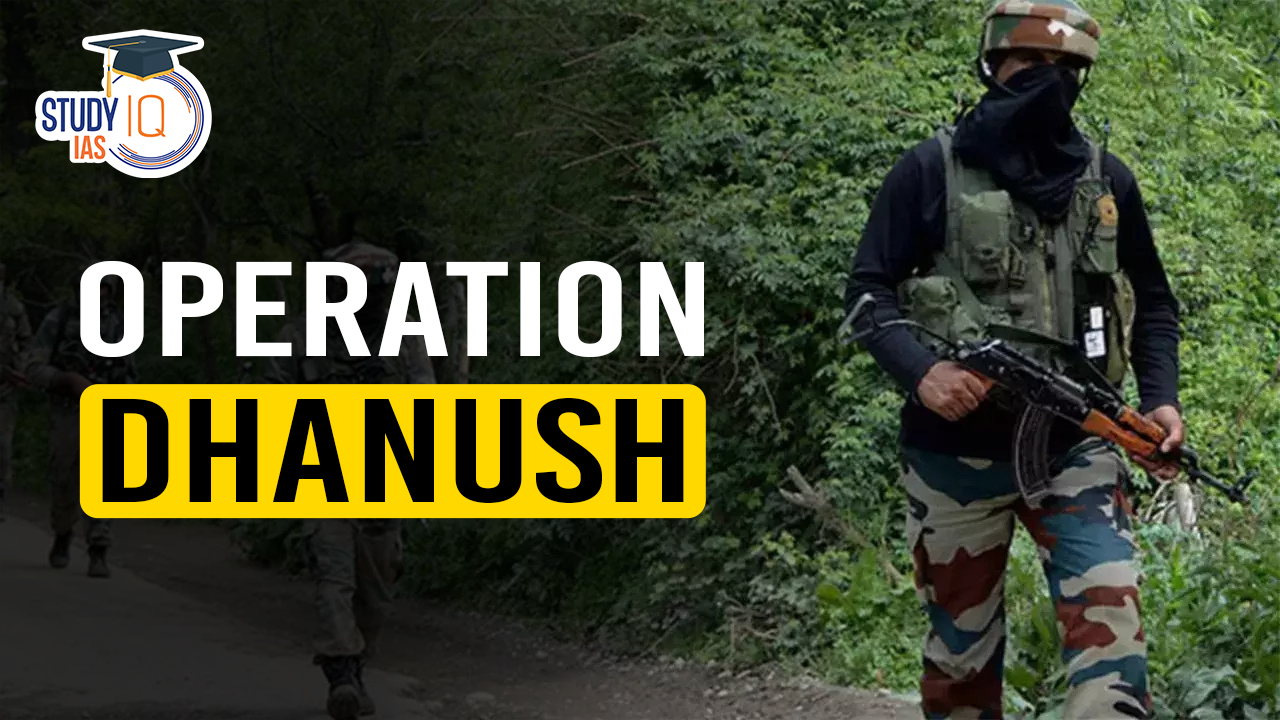Table of Contents
On July 16, 2024, in Srinagar, the Indian Army successfully neutralized three heavily armed infiltrators along the Line of Control (LoC) in the Keran sector of Kupwara district, Jammu and Kashmir. According to Army officials, the infiltrators, identified as foreign militants, were intercepted near the LoC fencing during a meticulously planned operation named Operation Dhanush.
What is Operation Dhanush?
Operation Dhanush is a military initiative by the Indian Army aimed at thwarting infiltration attempts along the Line of Control (LoC) in Jammu and Kashmir. Utilizing advanced surveillance and ambush tactics, it targets militants trying to cross from Pakistan-administered Kashmir. The operation involves preemptive strikes and coordination with security forces to safeguard against threats to regional stability, particularly during sensitive periods like religious pilgrimages such as the Amarnath Yatra.
Background of Operation Dhanush
The operation, which began following actionable intelligence inputs, was part of a proactive measure to secure the region amidst ongoing threats to peace, particularly targeting the annual Amarnath Yatra pilgrimage. Intelligence agencies had been tracking movements of terrorists near launch pads across the Keran sector, indicating a potential infiltration attempt aimed at disrupting normalcy in the region.
Commander N L Kurkarni of the 268 Brigade, Keran Sector, highlighted the significance of the operation, stating that the militants were equipped with heavy arms and ammunition. He emphasized that the timely action by ambush parties prevented a significant security breach, safeguarding both civilian lives and the sanctity of the Amarnath Yatra.
Details of Operation Dhanush
The engagement unfolded when ambush parties identified the infiltrators’ movement on July 14, prompting immediate action. Multiple surveillance techniques aided in tracking the terrorists’ progress, leading to a preemptive engagement before they could breach the LoC fence. In the ensuing firefight, precise and decisive measures by joint teams of army, BSF, and local police resulted in the neutralization of all three infiltrators.
Recoveries and Strategic Implications
Following the operation, a thorough search of the area uncovered a substantial cache of weapons and supplies intended for hostile activities. Recovered items included three AK-47 rifles, four pistols, six hand grenades, and other war-like stores. Additionally, items of Pakistani origin, such as cigarettes and food supplies, underscored the cross-border dimensions of the infiltration attempt.
Security Measures and Continued Vigilance
In response to escalating threats, the Indian Army had intensified vigilance along vulnerable sectors of the LoC, deploying advanced surveillance techniques and maintaining high alert status round the clock. The coordinated efforts of security forces and intelligence agencies played a pivotal role in preempting potential acts of terrorism, ensuring the safety of the region’s inhabitants and pilgrims participating in the Amarnath Yatra.
Conclusion
The successful neutralization of infiltrators near the LoC in Kupwara marks a significant victory for India’s counter-terrorism operations in Jammu and Kashmir. It underscores the resolve of security forces to thwart external threats and maintain peace in the region, particularly during sensitive periods such as religious pilgrimages. The operation serves as a reminder of the ongoing challenges posed by cross-border terrorism and the necessity for continued vigilance to safeguard national security interests.


 World Veterinary Day 2025: Theme, Histor...
World Veterinary Day 2025: Theme, Histor...
 List of States and Capitals of India, Ma...
List of States and Capitals of India, Ma...
 World Intellectual Property Day 2025, Th...
World Intellectual Property Day 2025, Th...





















